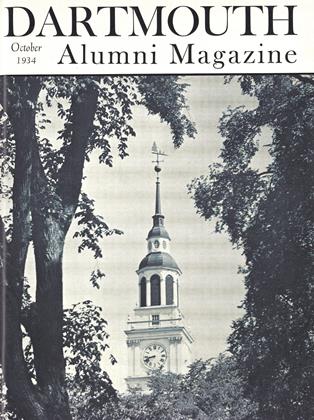A Poem and SixEssays on the Fate of Our Language. By Alexander Laing '25. With decorations by Isabel Lattimore. Farrar and Rinehart, New York. 1934. xii, 157 pp.
As the title of his book suggests, Mr. Laing believes that the English language needs both a stimulus and a purge. His earlier books, poetry and novels, have shown his fondness for words; it is no surprise, therefore, to discover this fondness expressed at length. The book, however, is not a merely personal expression; it is a thoughtful, reasoned attack and appeal. And it is interesting.- It can be recommended to all mature readers of taste. This is the audience that Mr. Laing addresses, "the practical users of English," though he makes a special appeal also to teachers and writers.
Gertrude Stein, James Joyce, the radio, Hollywood, and the press are the objects of attack. The first two are chosen as the best known representatives of a group which for some time has appeared to find conventional English unsatisfactory and has attempted to create a partially new language. But "is it actually true that the materials of the literary artist—his English words—had become so sterile, about twenty years ago, that conscientious authors saw no alternative but to set about the fashioning of a new speech?" Against the technical inventions which vastly increase the audience for the written and spoken word Mr. Laing charges the faults they have induced: hasty composition, "subservience of thought to spatial limits," and a resulting "transience of product." Correctives should be applied by teachers and writers, the former by maintaining standards and by training students, the latter by adapting to their own high purposes the newer technics, as the Elizabethans made use of their new invention, the theater.
That is a severely compressed summary of the thought of the book. The thought is not so well organized as it might be; the reader is sometimes annoyed by a lack of logical progression. And though the prose style is dignified and clear it is often tiresomely polysyllabic: e.g. "a mutable collocation of accidental similarities in the practical utterances of my forefathers."
The poem is, I think, the finest thing in the book. The mere fact that one finds it exciting to read an allegory about philology is sufficient commendation. In language consistently fine, occasionally splendid, Mr. Laing makes dramatic and memorable his passion for beauty of speech.
 View Full Issue
View Full Issue
More From This Issue
-
 Article
ArticlePREREQUISITES OF INTELLIGENCE
October 1934 By Ernest Martin Hopkins '01 -
 Class Notes
Class NotesClass of 1911
October 1934 By Prof. Nathaniel G. Burleigh -
 Article
ArticleHANOVER BROWSING
October 1934 By Herbert F. West '22 -
 Class Notes
Class NotesClass of 1913
October 1934 By Warde Wilkins -
 Class Notes
Class NotesClass of 1910
October 1934 By Harold P. Hinman -
 Class Notes
Class NotesClass of 1934
October 1934 By Martin J. Swyer, Jr.
Books
-
 Books
BooksFACULTY PUBLICATIONS
July 1919 -
 Books
BooksADVENTURES IN SPANISH ARCHAEOLOGY.
JUNE 1972 -
 Books
BooksShelf Life
Nov/Dec 2000 -
 Books
BooksTHE BIRDS OF MASSACHUSETTS AND OTHER NEW ENGLAND STATES
MAY 1930 By B. B. Leavitt -
 Books
BooksCITIZENSHIP AND CIVIC AFFAIRS,
May 1940 By Louis P. Benezet '99 -
 Books
BooksTHE COMPLETE COOKBOOK FOR MEN.
April 1962 By SUE TRIBUS

